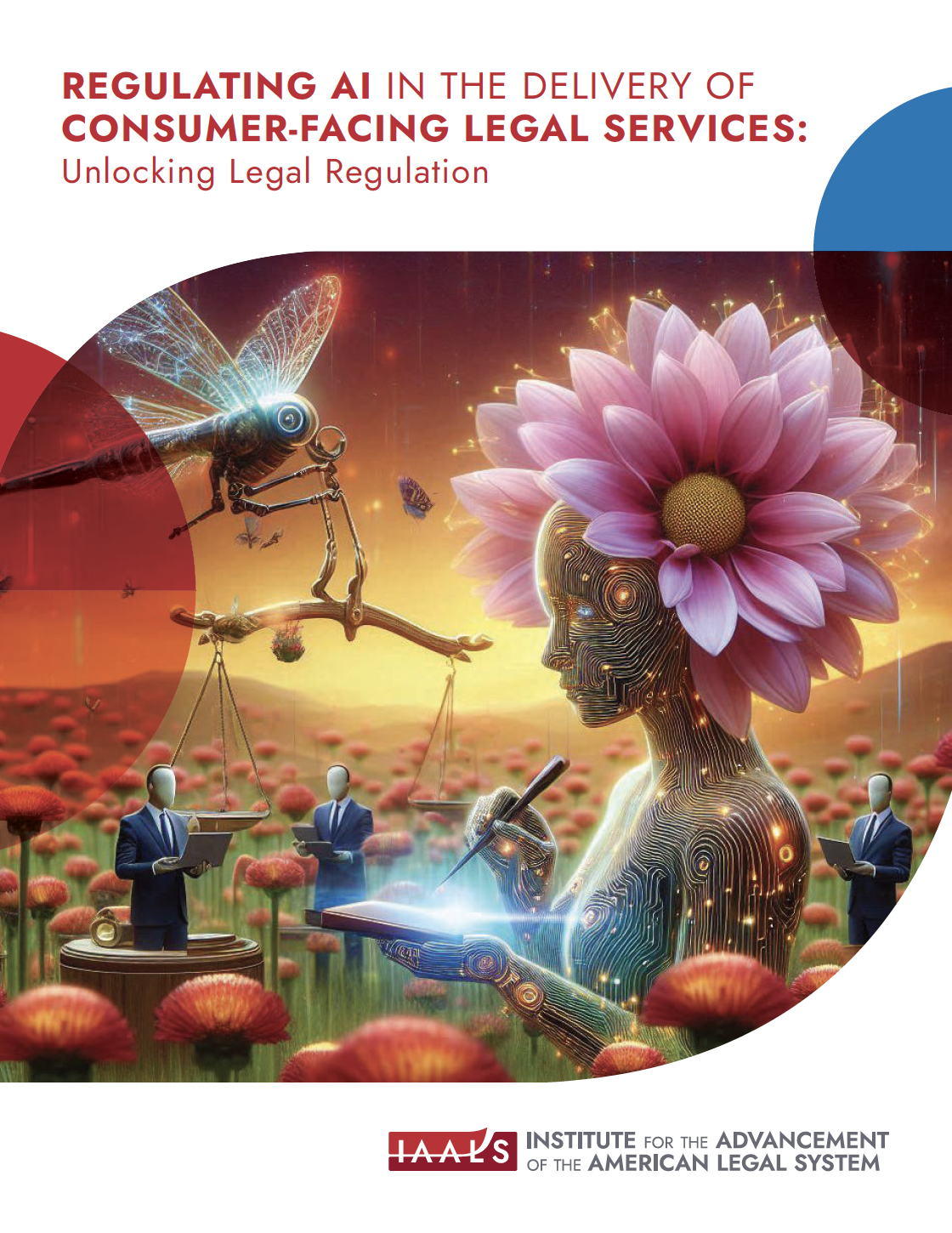Too many people cannot effectively access our legal system to protect their rights and resolve their disputes. Studies show that Americans seek lawyers for help or consider doing so for only 16 percent of the civil justice situations they encounter, and 76 percent of civil cases in state courts involve at least one party that does not have a lawyer at all. At the same time, restrictive rules prevent lawyers and others from serving clients in new ways. The vast unmet need for legal services undermines public confidence in our legal system.
We cannot continue to expect people to confront legal problems without legal advice. And if we want to make legal services more accessible, we must re-envision how they are delivered. IAALS’ Unlocking Legal Regulation project is about taking a bold step forward and laying the foundation for a consumer-centered regulatory system to ensure a more robust market for high-quality legal services—one that is competitive, broadly accessible, and better meets the needs of the people.
Objectives:
- Support and facilitate efforts to improve the regulation of legal services in the United States, including educating lawyers, courts, and the public on regulatory issues.
- Assess and support pilot projects for risk-based regulation in Utah and other states, including identifying metrics and conducting empirical research to evaluate outcomes.
- Develop a model for a regulatory entity focusing on risk-based regulation of legal services, with the goal of better serving and protecting consumers and having these attributes:
- Clearly articulated policy objectives and regulatory principles that drive governance, including a focus on outcomes and a proactive, preventative approach;
- Regulation of the provision of legal services, rather than only individual lawyers;
- Independence from management and control by those it regulates;
- Capability of operating at scale nationally; and
- State-of-the-art regulatory tools, guided by the assessment, analysis, and mitigation of consumer risk.
Project Staff:







IAALS Publications:
 Regulating AI in the Delivery of Consumer-Facing Legal Services
Regulating AI in the Delivery of Consumer-Facing Legal Services
July 2025: Stemming from our most recent convening on unlocking legal regulation, this publication includes a recommended phased approach to regulating the use of AI. The first phase should pursue “soft power” approaches as we learn more about AI, followed by a second phase of exploring potential regulatory changes.
- Unlocking Legal Regulation: Lessons Learned and Recommendations for the Future provides a set of 12 recommendations covering which stakeholders to engage in the regulation movement, program structure and requirements, messaging, research and data, and other areas.
- Community & Cooperation: Action Steps toward Unlocking Legal Regulation provides recommendations for bolstering existing regulatory innovation efforts and kickstarting new ones, and engaging new people and perspectives in the movement.
- Allied Legal Professionals: A National Framework for Program Growth provides a framework of national recommendations to serve as a guide for states considering, implementing, or refining ALP programs. See also our landscape report of ALP programs nationwide.
- Independent Regulator of Legal Services Policy Outline sets forth a system of regulation for legal service providers that envisions a non-profit, independent regulator of legal service providers implementing a risk-based approach to regulation.

Get Started:
IAALS recommends reviewing these resources first:
Get Involved:
- Subscribe to IAALS' regulation reform newsletter
- Submit resources and comments to this knowledge center.
- Share your feedback. How can we assist you in your regulatory reform efforts?
Recent News:
November 14, 2025
Non-Attys Could Help Close Georgia's Civil Justice Gap
Law360
November 3, 2025
Law Firm Ownership Could Be Opened to Non-Lawyers in Tennessee
Bloomberg Law
October 14, 2025
Regulatory Retrenchment in California: What AB 931 Means for ABS and MSO-Supported Law Firms
JD Supra
October 11, 2025
Private equity overcomes California hurdle to expansion in US legal market
Financial Times
October 8, 2025
Nonprofit law firms could help address Indiana’s lawyer shortage
The Indiana Lawyer
October 7, 2025
Expanding access to justice through responsible legal technology
DukeLaw
October 3, 2025
Illinois Moves Toward Approving Nonlawyers to Offer Limited Legal Advice
ABA Journal
Events:
Past IAALS Events
Spring 2025: AI, Access to Justice & UPL: Shaping the Future of Legal Services
IAALS and the Duke Center on Law & Tech hosted a 3-part webinar series for legal professionals, technologists, regulators and more, exploring AI's potential to make the future of legal services better for all.
November 2024: Unlocking Legal Regulation: Regulating AI in the Delivery of Consumer-Facing Legal Services
IAALS and national leaders gathered to discuss how regulators within the legal profession should think about regulating the use of Artificial Intelligence (AI) in the delivery of consumer-facing legal services. Read our recommended phased approach to regulating AI.
Jan./Feb. 2024: Two webinars examining the shifting dynamics in legal services provision and advocating for an inclusive and consumer-focused approach to legal reforms: Comparing the Roles of Allied Legal Professionals and Federal Accredited Representatives and Systems Change and How the Healthcare Industry Succeeded in Expanding Career Paths
October 2023: Unlocking Legal Regulation: Best Practices for Launching & Sustaining Regulatory Innovation
IAALS and a group of leaders from the different regulatory innovation movements met to create an initial set of recommendations for launching and sustaining regulatory innovation. Explore our 12 recommendations for the future of regulatory innovation.
Redesigning Legal Speaker Series
IAALS and its partners hosted a webinar series to discuss the regulatory changes underway, the challenges they face, and the opportunities they provide. Watch the webinars.
November 2022: Allied Legal Professionals Convening
IAALS and national experts and partners met to develop recommendations and best practices for states developing allied legal professional programs. Read our national framework.
June 2022: Unlocking Legal Regulation: Community & Cooperation
Read our action steps for bolstering innovation.
Future of Legal Services Speaker Series
Watch the webinars.
Debunking Common Arguments Against Regulatory Reform:
A Closer Look: Three Common Arguments Against Regulatory Reform
The Madness of the Lawyer Fee-Sharing Ban
Utah Evaluation:
Utah’s regulatory sandbox is built largely on the model IAALS developed and published in 2019. IAALS is acting as an independent third-party evaluator for the sandbox. We are conducting an interim evaluation, which we anticipate publishing in early 2024. Read more here.
IAALS Comments:
IAALS has submitted comments in several states in support of regulatory reform:
- Arizona
- California
- Colorado
- Illinois
- Indiana
- Georgia
- Texas
- Utah
- Washington
- Washington, D.C.

We live in a world where solutions are at our fingertips. From banking, to commuting, to buying a house, many innovative companies have emerged in the last decade to serve the needs of consumers, wherever they may be. But not legal needs. Similar companies cannot bring accessible legal solutions to the market because, in most places, today’s regulatory system says that anyone other than a lawyer providing legal services would be engaging in the unauthorized practice of law and subject to penalties—even if the services actually help rather than harm consumers. Such barriers can apply to simply providing legal information or helping create legal documents.
What’s more, in most jurisdictions, current rules prohibit lawyers from sharing their fees with others, which can prevent non-lawyers with innovative access-to-justice solutions from working directly with lawyers to develop them. And although lawyers themselves are regulated, there is no structure in place in any state to authorize entities that want to develop legal service offerings, which bars outside innovators from entering the market and helping to meet consumer needs. By limiting the provision of legal services, this regulatory structure effectively denies access to many consumers, both individuals and businesses.
Eliminating these obstacles is necessary for change, but simply revising rules written for a different era is not enough. We must re-envision how legal services are delivered. We live in a time of unprecedented technological disruption and we must shift our thinking to catch up to the present. Every incentive exists for the creation of new pathways to legal services—demand is enormous, creativity is abundant, and the tools are more sophisticated than ever before—but we must first unlock legal regulation to make it possible.
A new framework is needed to regulate entities providing legal services if we are to expand access, better protect consumers, and respond nimbly to rapid social and technological changes. Through Unlocking Legal Regulation, IAALS will work with others seeking to open doors for lawyers and other service providers to use innovative ways to help more people access our legal system.







